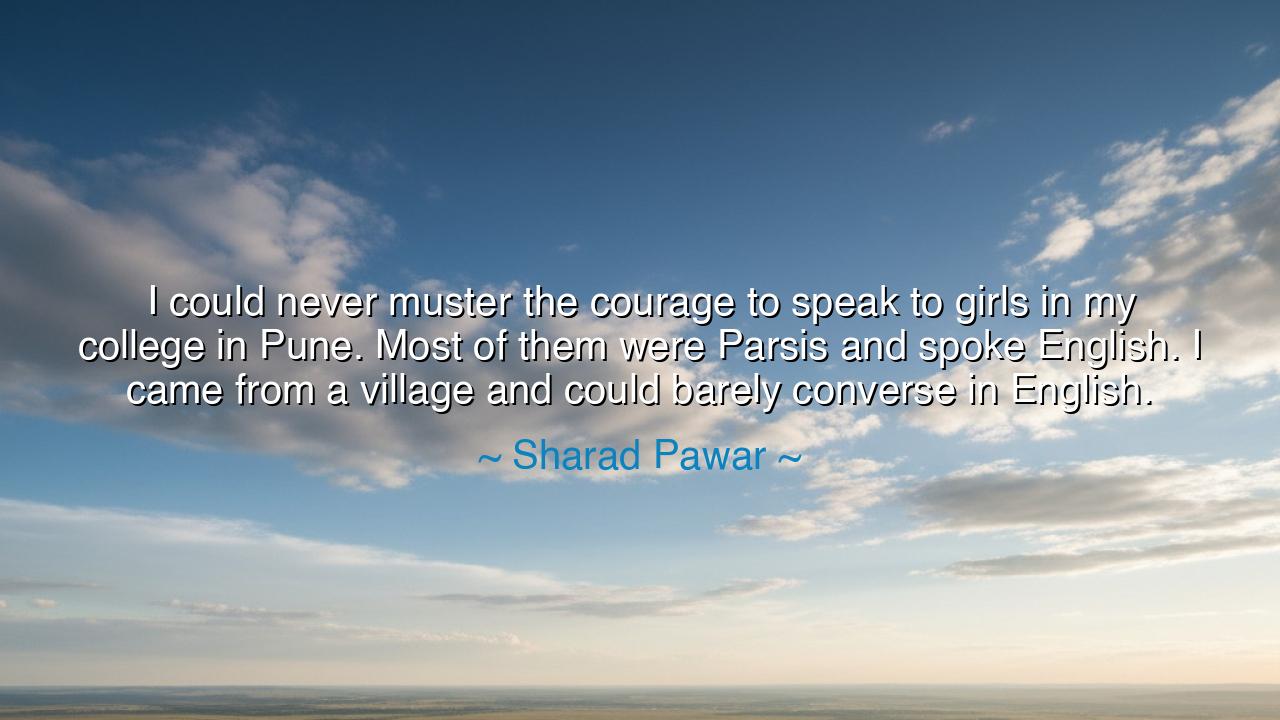
I could never muster the courage to speak to girls in my college
I could never muster the courage to speak to girls in my college in Pune. Most of them were Parsis and spoke English. I came from a village and could barely converse in English.






The words of Sharad Pawar—“I could never muster the courage to speak to girls in my college in Pune. Most of them were Parsis and spoke English. I came from a village and could barely converse in English.”—are not merely a recollection of youthful shyness; they are a window into the eternal struggle of the human soul as it confronts class, culture, and self-doubt. Beneath their simplicity lies a story of transformation: of a man who rose from humble soil to command the heights of political power, yet never forgot the trembling silence of his beginnings. His confession reveals that before every triumph, there is an invisible battlefield—the one within.
In these few lines, Pawar acknowledges the burden of language and belonging. English, to him then, was not just a tongue; it was a wall separating the privileged from the provincial, the confident from the hesitant. Many have felt this same wall—when they step into cities from small towns, when they sit among those who seem to speak the language of success while they themselves still carry the accents of struggle. What he truly speaks of is alienation, the sense of being a stranger in a world that moves with rhythms unfamiliar to one’s own.
Yet, it is from such alienation that courage is forged. Consider the story of Abraham Lincoln, born in a one-room log cabin, mocked for his rough manners and frontier dialect. He too, once an outsider to the polished halls of power, taught himself the language of law and leadership by the flicker of a candle. What separates those who rise from those who remain is not the absence of fear—but the willingness to walk through it. Pawar’s silence in youth was not weakness; it was the soil in which humility and determination took root.
The origin of greatness often hides behind moments of shame and inadequacy. Those who have never known embarrassment rarely grow; those who have felt small learn the value of rising tall. When Pawar later became one of India’s most influential leaders, his earlier insecurities became the source of his empathy. He could speak to farmers, laborers, and common people with authenticity, because he remembered what it felt like to stand on the edge of belonging, unsure of one’s worth.
This quote also reveals a deeper truth: language is power. It opens doors, builds bridges, and shapes thought itself. But language should never be worshiped as a god—it should be wielded as a tool. The man who once “could barely converse in English” learned, through experience and perseverance, that leadership is not about perfect grammar but about the courage to communicate one’s truth. In every era, those who master both humility and expression become the voices that move nations.
We may think of the ancient philosophers—Confucius, Socrates, or the Indian sages—none born into privilege, yet their words echo through millennia. Each began with a desire to understand, not to impress. From silence, they learned the weight of words. From ignorance, they gained the hunger for wisdom. In this way, Pawar’s memory becomes a parable: the path from village to city, from silence to speech, is not merely geographic—it is the soul’s pilgrimage toward self-confidence.
Let every listener, then, take this lesson to heart: do not despise the place of your beginnings. If you cannot yet speak the language of success, speak instead the language of effort. If you tremble in the presence of the learned, remember that the strongest voices were once unsure whispers. Greatness is not born in comfort, but in the ache of becoming.
And so, as the ancients might counsel, let each dawn be a dialogue with your own fear. Learn, listen, and rise. For the day will come when the very words you once struggled to utter will return to you as songs of victory.






AAdministratorAdministrator
Welcome, honored guests. Please leave a comment, we will respond soon